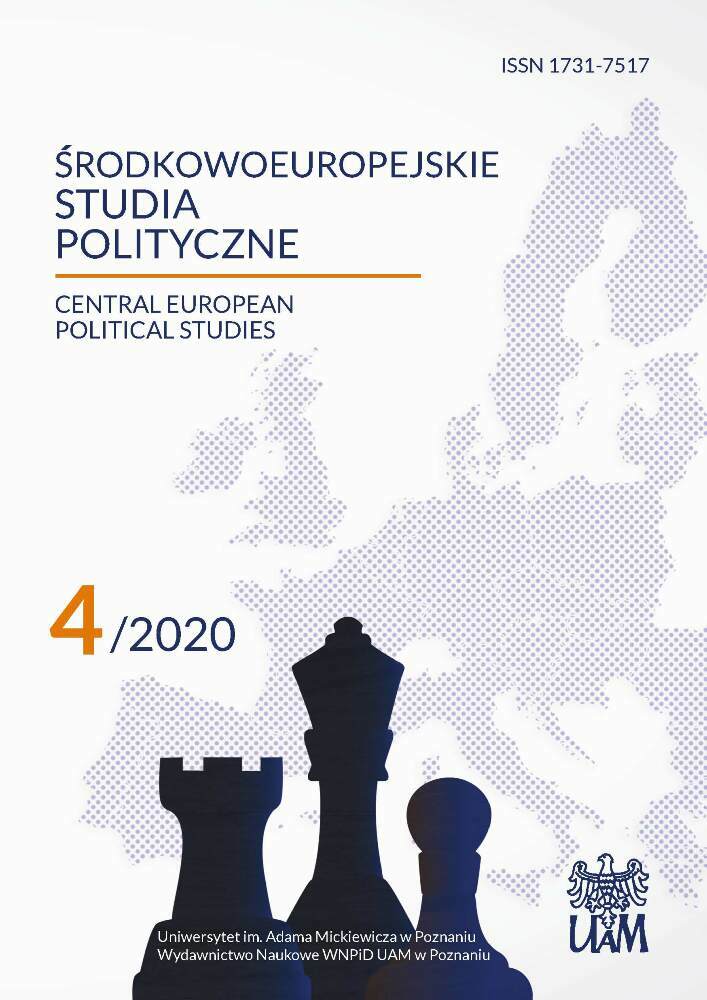Abstract
The purpose of the article is to examine the Russian threat to Ukraine’s state sovereignty and its impact on Poland’s national security; to underline that Russia intends to take revenge for its defeat in the Cold War, to regain control over the former Soviet Union republics, to defeat the USA and EU, and to establish control in the territory of the Eurasian continent. The research hypothesis is that the main purpose of Russia’s foreign policy is the reconstruction of a neo-imperial state, Ukraine’s reintegration into the post-Soviet space, and ensuring Russia’s domination in the region. The research task was completed using the research methods of a detailed study of sources and literature and a critical analysis of the information available to the author. Conclusions: Russia is trying to take revenge for its defeat in the Cold War, to regain control over the former Soviet Union republics, to defeat the West, and to establish control over the Eurasian continent. Russia considers Ukraine and Poland as dangerous agents of Atlanticism. That is why the Russian Eurasian geopolitical project aims for the Ukrainian and Polish states to be neutralized in a radical way. To this end, Russia has started a “hybrid war” against Ukraine. Poland and the Baltic countries will be the next targets of Russian aggression. It is profitable for Russian neo-imperialism to destroy trust and the strategic partnership between Poland and Ukraine, and to act in accordance with the divide-and-conquer algorithm. In such circumstances, Ukraine and Poland need to work out a new “Doctrine of restraining Russia’s aggression,” to pursue gradual and coordinated policy for the sake of the victory over Russian neo-imperialism and the dismantlement of the Russian imperial social system. The article describes the peculiarities of the modernization of the Russian imperial system at the present stage, analyzes the content of the Russian neo-imperialistic policy against Ukraine, Poland and the West, the reasons for the failure of Ukraine to neutralize Russian expansion, and also shows possible geopolitical consequences for the national security of Poland in the event of the successful implementation of Russia’s geopolitical strategy.
References
Allenova O., Heda E., Novykov V. (2008), Blok NATO razoshelsia na blokpakety, “Kommersant”, 4.07.2008, http://www.kommersant.ru/doc/877224, 15.10.2019.
Balcer A., Buras P. (2016), Eksperci: Rosja największym zagrożeniem dla bezpieczeństwa Polski, https://www.rp.pl/Publicystyka/307279909-Eksperci-Rosja-najwiekszym-zagrozeniem-dla-bezpieczenstwa-Polski.html, 27.07.2016.
Bashkyrova E., Fedorov Y. (1999), Labyrynty posttotalytarnoho soznanyia, “Pro et Contra. Preobrazovania v Rossii: itohi desiatyletia”, no. 2.
Bieleń S. (1997), Rosyjskie interesy bezpieczeństwa w Europie Środkowej, in: Bezpieczeństwo narodowe i międzynarodowe u schyłku XX wieku, eds. D. B. Bobrow, E. Haliżak, R. Zięba, Warszawa.
Biuro Bezpieczeństwa Narodowego (2018), https://www.bbn.gov.pl/pl/wydarzenia/8324,Ukraina-Szefowie-BBN-i-RBNiO-glownym-zagrozeniem-jest-dla-nas-Rosja.html, 2018.10.05.
Blan E. (2009), Rodom iz KHB. Sytema Putina, Kyiv.
Bobrov A. (2007), Russkii yazyk – universalnaia osnova rossiiskoho hosudarstva, russkoho mira, narochnitskaia.ru, 21.03.2007, http://narochnitskaia.ru/in-archive/russkiy-yazyik-universalnaya-osnova-rossiyskogo-gosudarstva-russkogo-mira.html, 15.10.2019.
Bukowiecka H. (2012), Polityka Federacji Rosyjskiej w regionie Morza Bałtyckiego, Toruń.
Bzhezynskyi Z. (1989), Bolshoi proval. Rozhdenie i smert kommunizma v dvadtsatom veke, New York.
Deliahyn M. H. (2004), Ozdorovyt Rossiu, “Zolotoi Lev: Izdanie Russkoi Konservativnoi Mysli”, 03.11.2004, http://www.zlev.ru/49_60.htm, 15.10.20190.
Dereń J. (2016), Warszawski Szczyt NATO projekcją sojuszniczego bezpieczeństwa, http://www.rocznikbezpieczenstwa.dsw.edu.pl/fileadmin/user_upload/wydawnictwo/RBM/RBM_artykuly/2016_1_1.pdf, 12.05.2016.
Dugin A. H. (1999), Osnovy heopolytiki. Heopolytycheskoe budushchee Rossii. Myslit Prostranstvom, Moskva.
Dugin A. H. (2016), Russkaia voina, Moskva, http://loveread.ec/read_book.php?id=52984&p=55, 15.10.20190.
Hromov A. (2013), Pohlynachi, “Nezalezhnyi kulturolohichnyi zhurnal «YI»”, http://www.ji-magazine.lviv.ua/anons2013/Gromov_Poglynachi.htm, 15.10.2019.
Hudkov L. (2014), Sytuatsyia v Ukraine i v Krymu, LEVADA-TSENTR, 13.03.2014, https://www.levada.ru/2014/03/13/situatsiya-v-ukraine-i-v-krymu, 15.10.2019.
Klocek F. (2018), Mocarstwowa polityka Federacji Rosyjskiej współczesnym zagrożeniem dla bezpieczeństwa Polski i regionu Morza Bałtyckiego, “De Securitate et Defensione. O Bezpieczeństwie i Obronności”, no. 2.
Kolosov V. A. (2002), Heopolytycheskaia i politycheskaia heohrafia, Moskva.
Koshkina S. (2015), Maidan. Nerasskazannaia istoryia, Kyiv.
Kyrychuk O. (2012), Ukrainskyi kontekst pravoslavnoho kontseptu «Ruskoho mira», “Istoriia relihii v Ukraini: naukovyi shchorichnyk. Knyha II”, Lviv.
Lartsev V. (2013), Neokolonizatsiia Ukrainy Rosiieiu: mif chy realnist, “Nezalezhnyi kulturolohichnyi zhurnal «YI»”, http://www.ji-magazine.lviv.ua/anons2013/Larcev_Neokolonizacija.htm, 15.10.2019.
Lukas E. (2009), Nova kholodna viina. Yak Kreml zahrozhuie i Rosii, i Zakhodu, Kyiv.
Mahda Y. (2015), Hibrydna viina. Vyzhyty i peremohty, Kyiv.
Mahda Y. (2017), Hibrydna ahresiia Rosii: uroky dlia Yevropy, Kyiv.
Mekhanizm tormozhenia: istoky, deistvyia, puti preodolenyia (1988), ed. V. V. Zhuravlev, Moskva.
Na porohekrizisa: narastanie zastoinykhyavlenii v partii i obshchestve (1990), ed. V. V. Zhuravlev, Moskva.
O komplekse mer po vovlecheniu Ukrayny v evrazyiskii internatsyonalnyi protsess (2013), “Dzerkalo tyzhnia”, 15.08.2013.
Pasichnyk V. (2007), Natsionalna ideia v konteksti ukrainsko-rosiiskykh vidnosyn, Lviv.
Polska Agencja Prasowa (2015), Doktryna wojenna Rosji zagraża Polsce? RBN, https://www.tvn24.pl/wiadomosci-z-kraju,3/rbn-o-doktrynie-wojennej-rosji,525179.html, 18.03.2015.
Pro natsionalnu bezpeku Ukrainy: Zakon Ukrainy (2018), http://zakon2.rada.gov.ua/laws/show/2469-19, 11.11.2020.
Putin V. (2011), Novyi internatsyonalnyi projekt dlia Evrazii – budushche, kotoroe rozhdaetsia sehodnia, “Izvestyia”, 11.10.2011, https://www.izvestia.ru/news/502761, 15.10.2019.
Putin V. (2012), Rossia: natsyonalnyi vopros, “Nezavysymaia hazeta”,21.01.2012.
Reitinh doveryia Putyna upal nizhe 50% (2013), “Vedomosti”, 4.03.2013, https://www.vedomosti.ru/politics/articles/2013/03/04/vciom_bolshinstvo_rossiyanne_vidyat_alternativy_putinu, 15.10.2019.
Shchedrovytskyi P. (2000), Russkii mir i Transnatsyonalnoe russkoie, “Russkyizhurnal”, 2.03.2000, http://old.russ.ru/politics/meta/20000302_schedr.html, 11.11.2020.
Sherman H. (2000), Vyklyky rehionalnoi bezpeky dlia Ukrainy, “Natsionalna bezpeka i oborona”, no. 7.
Shmelev B. (1998), Intehratsyia na postsovetskom prostranstve: myfy i realnost, “Vlast”, no. 5.
Shtepa P. (2010), Moskovstvo: yoho pokhodzhennia, zmist, formy i istorychna tiahlist, Drohobych.
Stratehia dlia Rosii (1994), “Nezavysymaia hazeta”, 24.05.1994.
Stratehiia natsionalnoi bezpeky Ukrainy (2015), http://zakon2.rada.gov.ua/laws/show/287/2015, 15.10.2019.
Szubrycht T. (2010), Bałtyckie wymiary bezpieczeństwa, Gdynia.
Tishkov V. (2007), Russkyi mir: smysl stratehii, “Stratehia Rossii”, no. 7, http://sr.fondedin.ru/new/fullnews_arch_to.php?subaction=showfull&id=1185274651&archive=1185275035&start_from=&ucat=14&, 11.11.2020.
Vorotylenko M. (2007), Zapovit Petra I, Kyiv.
Voslenskyi M. S. (1991), Nomenklatura. Hospodstvuiushchyi klass Sovetskoho Soiuza, Moskva.
Zapałowski A. (2015), Bezpieczeństwo Polski w geopolitycznej grze Zachodu z Rosją. Antologia tekstów z zakresu geopolityki i bezpieczeństwa z lat 2014–2015, Warszawa.
License
Copyright (c) 2021 Orest Krasivskyy

This work is licensed under a Creative Commons Attribution 4.0 International License.

